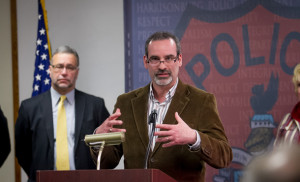Courses: Law Enforcement Through Restorative Justice: Peacebuilding in the Community
- 13 March 2018 3:00 pm
- 20 March 2018 3:00 pm
- 27 March 2018 3:00 pm
- 3 April 2018 3:00 pm
Course Description
This four-part course is an introduction to restorative justice with an emphasis on its applications in law enforcement and community-engaged program partnerships. Participants will explore innovative ways to incorporate restorative justice within an agency, and to collaborate with community organizations on such initiatives. Through presentations and interactive discussions, examples of implementation in police agencies throughout the United States will be showcased. Some of these will include:
- An alternative to, or within, the criminal justice system
- Citizen complaints
- Internal conflict and
- Community engagement.
Restorative justice is often referred to as “the missing piece in law enforcement”. You will learn why police chiefs around the country have been utilizing or are incorporating restorative justice as an option within their organization. From victim advocacy, to offender accountability, restorative justice provides many benefits to an entire community. For example, police departments experience a high rates of victim satisfaction, community participation, and reduction in offender recidivism which ultimately results in accomplishing procedural justice and police legitimacy.
Course Objectives
- Explore why and how law enforcement is implementing restorative justice programs across this country
- Engage select guest speakers on the greatest successes and challenges they have faced in applying restorative justice to law enforcement.
- Learn about innovative restorative justice practices that have enhanced law enforcement and community engagement, partnerships, and collaboration
- Grapple with how to make law enforcement more restorative – changing structures, policies and procedures
Target Audience
The course is intended for people working in or associated with law enforcement agencies. Criminal justice practitioners, law enforcement agency directors, command level officers and those working in the field will benefit from this series.
Course Structure & Cost
The course will be held four consecutive weeks for 90 minutes per session – (Tuesdays, March 13 – April 3, 2018 from 3-4:30 pm (EST), and will be synchronous, (i.e. live) through the Zoom platform. Unlike a webinar, all participants will be able to see, hear and speak to the others. Participants will need access to an internet-connected computer with webcam and microphone, head phones, a quiet spot and good lighting.
Enrollment is limited to 25. This is a non-credit course however, a certificate of participation will be provided upon request.
Course Fee: $200 for the full 4-week course.
Instructor Bios
 Officer Vanessa Westley is a twenty-five year veteran of the Chicago Police Department. She has served in various positions within the Department’s Patrol Division and other units. She began her service in Community Policing in 2004 under now-retired First Deputy Dana V. Starks, as project manager in the Department’s CAPS Project Office. She later served as project manager for the Mayor’s Office of Faith Based and Community Partnerships. Currently she is the program manager for the Chicago Police Department’s and the Metro YMCA’s “Bridging the Divide” program. She is the special projects coordinator for the CAPS Revitalization effort launched in 2013. She leads the community engagement training program for the Department through DePaul University’s Center for Urban Education. Vanessa is a Restorative Justice and Art of Hosting practitioner and trainer.
Officer Vanessa Westley is a twenty-five year veteran of the Chicago Police Department. She has served in various positions within the Department’s Patrol Division and other units. She began her service in Community Policing in 2004 under now-retired First Deputy Dana V. Starks, as project manager in the Department’s CAPS Project Office. She later served as project manager for the Mayor’s Office of Faith Based and Community Partnerships. Currently she is the program manager for the Chicago Police Department’s and the Metro YMCA’s “Bridging the Divide” program. She is the special projects coordinator for the CAPS Revitalization effort launched in 2013. She leads the community engagement training program for the Department through DePaul University’s Center for Urban Education. Vanessa is a Restorative Justice and Art of Hosting practitioner and trainer.

Carl Stauffer, co-director of the Zehr Institute for Restorative Justice at EMU’s Center for Justice and Peacebuilding, speaks about the Harrisonburg Police Department’s new restorative justice program, the first of its kind in Virginia. Stauffer is a member of the steering committee, which includes restorative justice practitioners from the community and James Madison University, as well as representatives from area law firms and the office of the Commonwealth’s attorney. (Photo by Jon Styer)
Dr. Carl Stauffer teaches Restorative and Transitional Justice at the Graduate Center for Justice and Peacebuilding, Eastern Mennonite University, Harrisonburg, Virginia. Stauffer also serves as Co-Director of the Zehr Institute of Restorative Justice and the Academic Director of the Caux Scholars Program in Switzerland.
Stauffer entered the Restorative Justice field as the first Executive Director of the Capital Area Victim-Offender Reconciliation Program in Richmond, Virginia in 1991. In 1994, Stauffer and his family moved to South Africa where he worked with various transitional justice processes such as the Peace Accords, Community-Police Forums, the Truth and Reconciliation Commission and Local Community Development structures. From 2000 to 2009, Stauffer was appointed as the Mennonite Central Committee Regional Peace Adviser for the Southern Africa region. His work has taken him to 20 African countries and 15 other countries in the Caribbean, Middle East, Europe, Asia and the Balkans.


